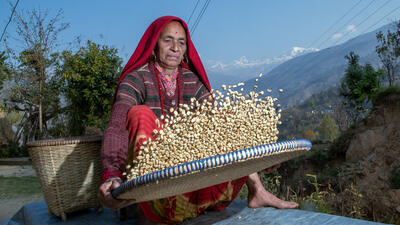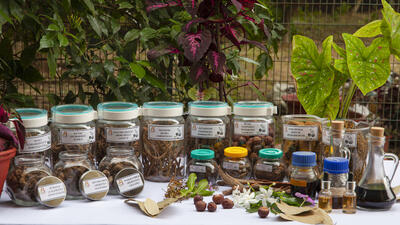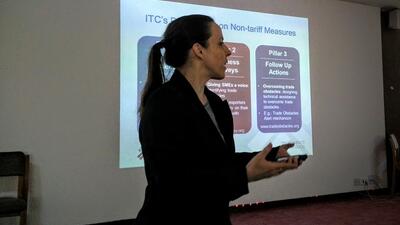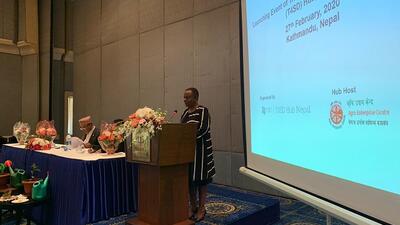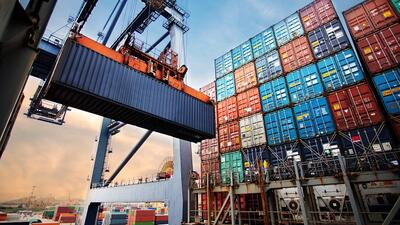


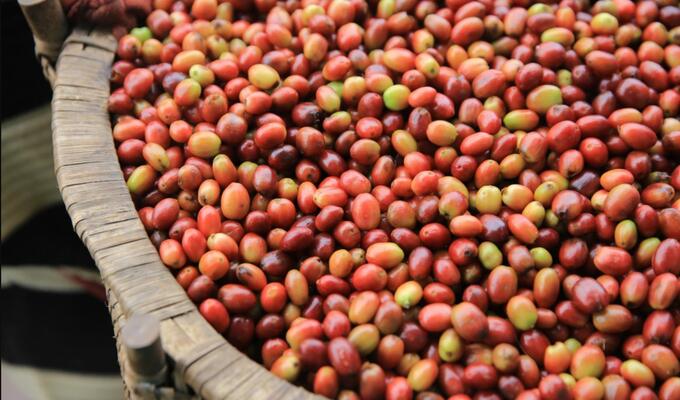
Coffee trainer Surya earns pride of Nepal’s indigenous Dura community
ITC-supported training changed Surya’s career. He’s now spreading modern techniques of coffee brewing and processing among newcomers in Nepal.
After completing school, Surya Bahadur Dura was under immense pressure to take up any job to support his family in the remote Lamjung district of Gandaki Province. Finding a job was next to impossible then, since he hadn’t advanced far with his studies and he didn’t have any work experience. He ended up working as a kitchen assistant in a coffeeshop in Pokhara, a popular tourist destination.
’It was a great relief for me when I got the opportunity to work in the café. That is where I learned basic techniques of coffee making,’ said Surya, now 30.
He sharpened his skills in coffee brewing while working various cafés in Pokhara. As his confidence grew, Surya decided in 2020 to open his own café to serve Nepalese specialty coffee.
‘My interest in coffee making grew in such a way that it inspired me to open this café – Lake City Café,’ said Surya, who now employs five assistants.
Surya has been also promoting Lake City brand coffee, now one of Nepal’s most popular specialty coffees.
‘I could establish Lake City brand coffee due to a Q-Processing Professional training that taught me modern techniques of green coffee bean processing which not only reduces wastage but also enhanced the coffee’s quality,’ said Surya.
He was one of 16 participants who joined the prestigious course, created by the same institute that created the Q Grader programme to certify top coffee experts. In a bid to enhance the quality of Nepalese specialty coffee, the International Trade Centre (ITC) under the EU-Nepal Trade and Investment Programme, organized the Q-Processing Professional training on 1-6 March 2022 in Gorkha district.
‘That training was a turning point to uplift my coffee processing skills and brighten my career in this sector. Thanks to ITC for granting the opportunity to participate in the hands-on training,’ said Surya.
Spreading coffee skills in Nepal
He’s among the 10 participants who got the Q-Processing Professional Certificate provided by the Coffee Quality Institute (CQI).
The six-day training not only upskilled him in coffee bean processing but also boosted his confidence for his own institute to train others in coffee processing and brewing.
‘I am proud to have become one of the very limited numbers of skilled baristas in Nepal who possess high-level knowledge of coffee processing and coffee brewing. I have established my own coffee value chain through the collection of coffee beans, processing, and brewing,’ said Surya,
Surya has been sharing his knowledge and skills with coffee farmers. He has linked coffee farms to his café by processing organic coffee beans collected from local farms in Kaski district.
‘I have a guaranteed market for coffee produced by local farmers who have been supplying their products in required quality for my processing unit,’ said Surya. The wastage from processing has dropped significantly, while the quality of coffee has improved since Surya learned scientific techniques of processing.
He’s collected more than 500 kg of green coffee beans from local farms this year – and that amount is increasing year by year.
‘I need to arrange for more coffee beans every year to cater to a rising number of coffee lovers visiting my café,’ added Surya.
Surya’s Lake City brand coffee was declared one of the best-quality brands at the recently concluded National Coffee Summit and Expo 2023 in Kathmandu. Surya was also a judge in the barista competition at the summit. Surya’s goal now is to popularize specialty Nepalese coffee across the world.
‘I have seen the huge prospect of Nepalese specialty coffee becoming a global premium brand. I am planning to focus my efforts to sensitize all stakeholders of the coffee sector about the special quality and export potential of Nepalese coffee,’ said Surya.
‘I hope my dream of making Nepalese coffee the world’s most preferred coffee will come true one day,” said Surya, sipping freshly brewed coffee at his own café.
About the project
The Nepal Trade-Related Assistance project contributes to Nepal’s sustainable and inclusive economic growth and poverty reduction, and more specifically aims to increase trade and participation in regional and global value-chains. Next to support in trade policy and facilitation, the project focuses on expanding Nepal’s export base in coffee and pashmina value chain, by linking rural producers to exporters and connecting those to regional and international markets.




